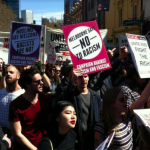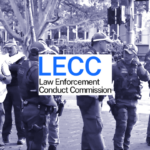Police More Interested In Manufacturing Offences than De-Radicalising Youth

Law enforcement agents conducted yet another high-profile anti-terrorism operation recently, this time raiding the home of a 16-year old boy in Auburn last Sunday night.
Details of the allegations were released on Monday morning, with the Sydney Morning Herald reporting that, according to police, the teenager had attempted to acquire a firearm and indicated an intention to engage in an ANZAC day attack.
“Officers were forced to act yesterday afternoon. We had to do that in order to ensure the safety of the community,” Police Commissioner Andrew Scipione said just after the Martin Place Dawn Service.
“Clearly we’ve taken that action with community safety on the eve of the sacred day which is Anzac Day.”
Speaking after the announcement, Federal Justice Minister Michael Keenan told reporters that he “would not reveal details about the alleged plot”, but that there was “no indication police would make more arrests.”
Police Conduct Criticised
Fresh revelations that police were involved in assisting the youth to acquire the firearm have cast doubt on the official narrative.
According to the Guardian Australia, members of the New South Wales Police Force posed online as supporters of Muslim extremism, and discussed obtaining the weapon with the young man prior to his arrest.
It is also understood the teenager was involved in an official “de-radicalisation” program, which involved regular welfare checks by police and referral to counsellors and religious authorities.
Experts who advise the police and government on violent extremism say the revelations are a “huge risk to the integrity” of the de-radicalisation programs, comparing it to officers posing as drug dealers outside a police-run drug rehabilitation facility.
The young man pleaded not-guilty to the sole charge of “preparation or planning for a terrorist act” in Parramatta Children’s Court. The offence carries a maximum penalty of life imprisonment.
Police Stings: Creating Radicals
This is not the first time police have encouraged, coaxed or even ‘entrapped’ vulnerable teenagers into claiming online that they would participate in radical acts, then arresting and charging them with extremely serious terrorism offences, then claiming a public victory.
Anti-terror sting operations, where police pose as extremists and encourage their targets to self-incriminate, or ‘entrap’ them, have become a common practice around the world.
In America, the use of stings has come under fire for radicalising young men that otherwise would not have become threats, as was the case for Sami Osmakac.
Sami Osmakac was 25 years old when he filmed what the FBI and U.S. Department of Justice would call his martyrdom video:
“This video is to all the Muslim youth and to all the Muslims worldwide… This is a call to the truth. It is the call to help and aid in the party of Allah … and pay him back for every sister that has been raped and every brother that has been tortured and raped.”
According to the US government, Osmakac was a dangerous, lone-wolf terrorist. Law enforcement agents claimed if they hadn’t have arrested Osmakac shortly after the video, he would have gone on to bomb a nearby bar and local casino.
But if Osmakac’s mind was moulded towards radicalism, it was at the hands of ambitious federal agents. At the time of the recording, Osmakac was broke and struggling with mental illness. He had no money to buy guns or explosives, or even fix the battery on the car that would be his delivery vehicle. There was also no evidence he had connections to any international terrorist group or person.
His only contact was an undercover FBI informant, who encouraged him to follow through with the attack. Although he wasn’t aware of it, Osmakac was also being supported by a team of FBI agents who had provided him with weapons, cab money, and the continual prodding necessary to convince him to make the video and plan an attack.
Trevor Aaronson, who uncovered the story for The Intercept, went on to write that Osmakac: “became a ‘terrorist’ only after the FBI provided the means, opportunity and final prodding necessary to make him one.”
Australian De-Radicalisation Programs on Wrong Track
Although the circumstances of the Auburn arrest are quite different from Osmakac’s case, the two highlight the tension created when police are left in charge of both de-radicalisation and law enforcement.
Anne Aly, a specialist who police consulted on the issue, has argued that de-radicalisation should be run by community groups at arm’s length from law enforcement.
“I do not blame the police because it actually puts them in a very precarious situation, where on one side they’re doing deradicalisation, which is social and community-based, and necessarily so; and on the other side there’s the law enforcement aspect.” she said.
“You’re putting police in a position where they have to be both, and obviously the law enforcement comes first.”
Clarke Jones, the head of a community intervention research and support hub at the Australian National University, agreed that it was problematic for police to perform these dual roles, telling the Sydney Morning Herald:
“Because of the lack of any connection to community or social issues, these programs lack all of the nuances required to address the problem… The government needs to stop what they’re doing, examine, reassess and scrap things that aren’t working.”
A Government spokesperson defended the current program in a statement claiming programs were “based on best available research and international best practice,” while conceding that “no program can ever guarantee a 100 per cent success rate.”






